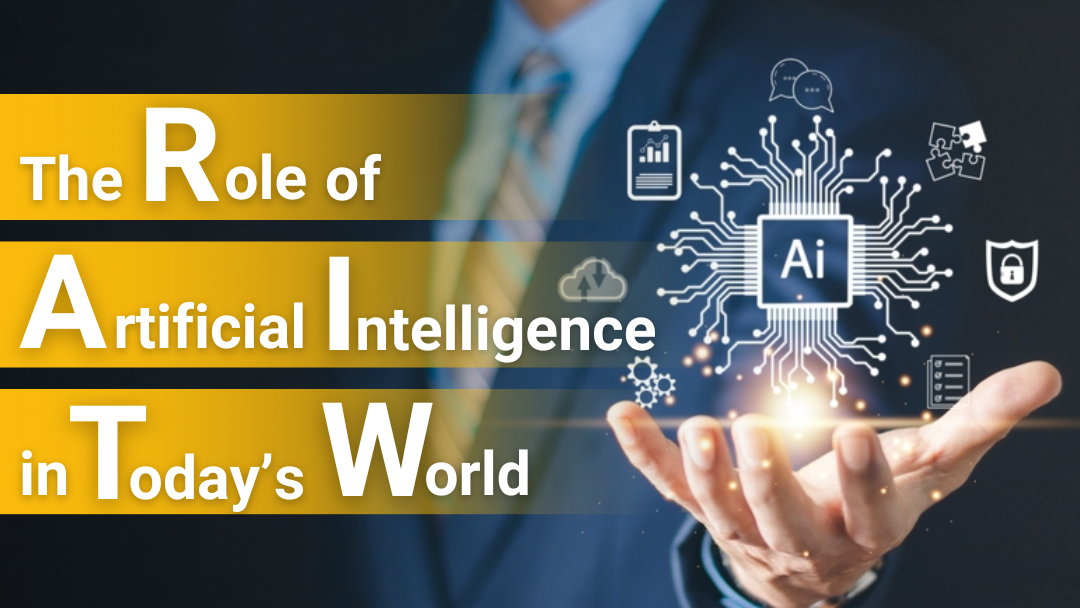Are you unclear about what exactly AI is? This article will help you understand artificial intelligence, its types, pros and cons, and its role in today’s world. Read till the last to know everything.
What is Artificial Intelligence (AI)?
Artificial Intelligence (AI) refers to the simulation of human intelligence in machines that are programmed to mimic cognitive functions such as learning, problem-solving, perception, reasoning, and decision-making. These machines are designed to perform tasks that typically require human intelligence, but they can often perform them faster and more accurately than humans.
Artificial Intelligence (AI) comprises a wide range of methods, such as robotics, computer vision, natural language processing, machine learning, and expert systems. These techniques enable AI systems to analyze large amounts of data, recognize patterns, make predictions, and adapt to new information without explicit programming.
Two Main Types of AI:
1) Narrow AI (Weak AI): Narrow AI is designed to perform specific tasks within a limited domain. Examples of narrow AI include virtual assistants like Siri and Alexa, recommendation systems, spam filters, and autonomous vehicles.
2) General AI (Strong AI): General AI refers to AI systems that have the ability to understand, learn, and apply knowledge across a wide range of tasks and domains, similar to human intelligence.
Role of Artificial Intelligence (AI)
Artificial Intelligence (AI) plays a significant role in today’s world across various sectors and industries. Some of the key areas where AI is making an impact include:
1) Automation: AI is automating repetitive tasks and processes across industries, increasing efficiency and productivity. This includes manufacturing, customer service, data entry, and more.
2) Personalization: AI algorithms analyze large datasets to personalize experiences for users. This is seen in recommendation systems used by companies like Amazon and Netflix, as well as personalized advertisements and content recommendations on social media platforms.
3) Healthcare: AI is revolutionizing healthcare with applications such as disease diagnosis, personalized treatment plans, drug discovery, and medical imaging analysis. AI-powered systems can analyze medical records and images to assist healthcare professionals in making more accurate diagnoses and treatment decisions.
4) Finance: Artificial Intelligence is utilized in the finance sector for risk assessment, algorithmic trading, fraud detection, and customer support. AI algorithms analyze financial data in real time to identify patterns and make predictions, helping financial institutions make informed decisions.
5) Autonomous Vehicles: AI plays a crucial role in the development of autonomous vehicles, enabling them to perceive their environment, make decisions, and navigate safely. Companies like Tesla, Waymo, and Uber are investing heavily in AI technology for self-driving cars.
6) Natural Language Processing (NLP): Computers can now comprehend, interpret, and produce human language thanks to NLP. AI-powered NLP applications include virtual assistants like Siri and Alexa, language translation services, sentiment analysis, and chatbots used for customer support.
7) Education: AI is transforming education through personalized learning experiences, intelligent tutoring systems, and adaptive learning platforms. AI algorithms can analyze student data to identify individual learning needs and tailor educational content accordingly.
8) Cybersecurity: AI is used to detect and respond to cybersecurity threats in real-time. AI-powered systems can analyze vast amounts of data to identify anomalous behavior and potential security breaches, helping organizations prevent and mitigate cyberattacks.
9) Environmental Monitoring: AI is used for environmental monitoring and conservation efforts. AI algorithms analyze satellite imagery, sensor data, and other sources of environmental data to track changes in ecosystems, monitor wildlife populations, and detect environmental risks.
10) Retail: In the retail industry, AI is used for demand forecasting, inventory management, personalized marketing, and customer service. AI-powered chatbots and virtual shopping assistants help customers find products and make purchasing decisions online.
Overall, AI is transforming various aspects of our lives and has the potential to drive significant advancements across industries in the years to come.
What are the Pros of Artificial Intelligence?
Artificial Intelligence (AI) offers a wide range of benefits and advantages across various sectors. Some of the key pros of AI include:
1) Increased Efficiency: AI automates repetitive tasks, leading to increased efficiency and productivity in various industries.
2) Cost Savings: By automating tasks and processes, AI can lead to significant cost savings for businesses. AI-powered systems can perform tasks around the clock without the need for breaks or overtime pay.
3) Improved Accuracy: AI systems can analyze large datasets and perform complex calculations with a high degree of accuracy. This is particularly beneficial in fields such as healthcare, finance, and manufacturing, where precision is critical.
4) Enhanced Decision-Making: AI algorithms can analyze vast amounts of data to identify patterns, trends, and insights that may not be immediately apparent to human analysts. Using data-driven insights, this assists firms in making well-informed decisions.
5) Personalization: AI enables personalized experiences for users in various domains, such as personalized recommendations in e-commerce, personalized healthcare treatments, and personalized learning experiences in education.
6) 24/7 Availability: AI-powered systems don’t require breaks or downtime to run continually. This ensures that services like customer support and online assistance are available to users around the clock.
7) Innovation: AI stimulates innovation by making it feasible to create previously impractical new goods, services, and solutions. This includes advancements in fields such as autonomous vehicles, healthcare diagnostics, and natural language processing.
8) Improved Safety: AI can be used to enhance safety in various contexts, such as autonomous vehicles that reduce the risk of accidents, AI-powered surveillance systems that improve security, and predictive maintenance systems that prevent equipment failures.
9) Assistance for Human Workers: AI can assist human workers by automating mundane tasks, providing valuable insights and recommendations, and augmenting human capabilities in areas such as creativity, problem-solving, and decision-making.
10) Addressing Complex Problems: AI has the potential to tackle complex problems that are beyond the capabilities of human beings alone, such as climate modeling, drug discovery, and space exploration.
Overall, AI offers numerous benefits that have the potential to drive significant advancements and improvements in various aspects of our lives and society. However, it’s important to address ethical, social, and economic considerations to ensure that AI is developed and deployed responsibly.
What are the Cons of Artificial Intelligence?
While Artificial Intelligence (AI) offers numerous benefits, it also presents several challenges and drawbacks. Some of the key cons of AI include:
1) Job Displacement: One of the most significant concerns surrounding AI is the potential for job displacement. As AI automates tasks and processes, it can lead to the elimination of certain jobs or the need for fewer human workers in certain industries, leading to unemployment and economic disruption.
2) Bias and Fairness: AI algorithms can inadvertently perpetuate or amplify biases present in the data used to train them. This can lead to unfair or discriminatory outcomes, particularly in areas such as hiring, lending, and criminal justice, where AI systems are increasingly being deployed.
3) Ethical Dilemmas: AI raises complex ethical dilemmas, particularly in areas such as autonomous weapons, facial recognition technology, and AI-driven decision-making in critical domains like healthcare and criminal justice. Ethical considerations surrounding AI development, deployment, and regulation are still being actively debated.
4) Lack of Transparency: A lot of AI systems function as “black boxes,” which means that humans cannot see into or comprehend how they make decisions. This lack of transparency can make it difficult to trust AI systems and assess their reliability and fairness.
5) Security Risks: Cybersecurity risks, such as hostile assaults, data leaks, and content manipulation by AI, can affect AI systems. Malicious actors could exploit vulnerabilities in AI systems to cause harm or deceive users.
6) Dependency and Overreliance: There is a risk of overreliance on AI systems, leading to a loss of human skills and expertise. Overdependency on AI could also make societies more vulnerable to disruptions caused by system failures or malicious attacks.
7) Unemployment and Economic Inequality: Job displacement caused by AI could exacerbate existing socioeconomic inequalities, particularly if displaced workers lack the skills or resources to transition to new roles or industries. This could widen the gap between the wealthy elite who benefit from AI technologies and those who are left behind.
8) Algorithmic Accountability: Ensuring accountability for the decisions made by AI algorithms is challenging, particularly when those decisions have significant real-world consequences. There is a need for mechanisms to hold AI developers and deployers accountable for the ethical and social implications of their systems.
9) Existential Risks: While still speculative, some experts have raised concerns about the potential long-term risks of AI, including the emergence of superintelligent AI systems that could pose existential threats to humanity.
Addressing these cons requires careful consideration of the ethical, social, and economic implications of AI development and deployment, as well as the implementation of appropriate regulations and safeguards.
SUMMING UP
AI systems are designed to mimic human cognitive functions and adapt to new situations or environments. It plays a pivotal role in today’s world across various sectors and industries, driving transformative changes and advancements.
Overall, AI is reshaping various aspects of our lives and society, driving innovation, efficiency, and advancements while also posing challenges related to job displacement, bias, privacy, ethics, and security. Addressing these challenges requires careful consideration of ethical, social, and economic implications, alongside the implementation of appropriate regulations and safeguards.

